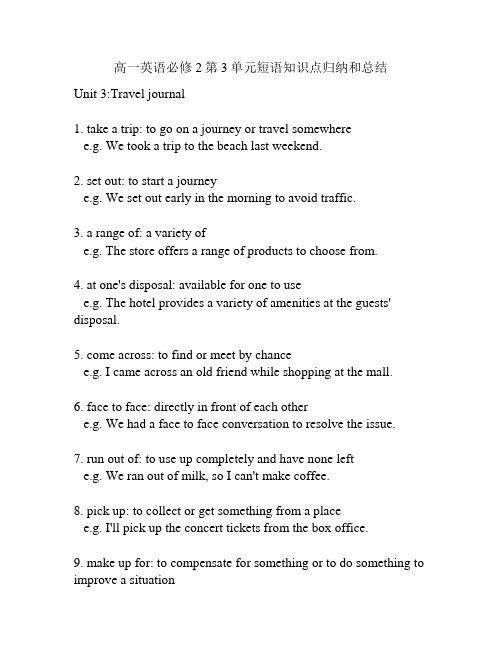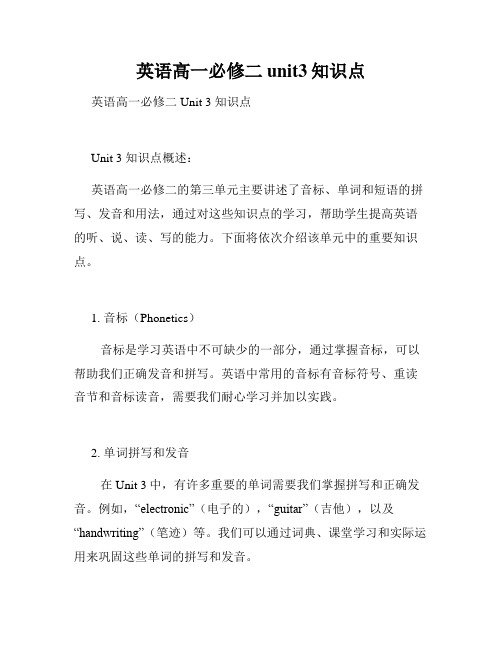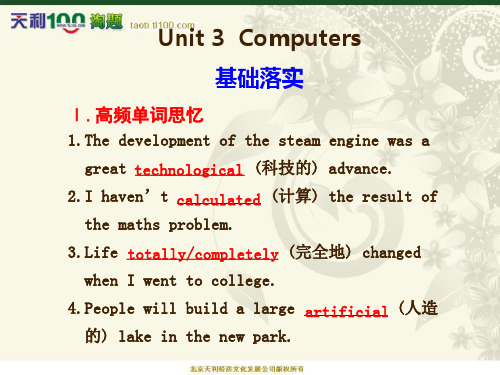人教版高中英语高一必修二单元三Book2Unit3知识点整理
人教版高中英语必修二知识点__unit3

高一英语课文知识点模块IIUNIT 3mon 形容词a.1. )普通的;常见的=generalSmith is a very common last name in England.在英国史密斯是很常见的姓。
2. )一般的,平常的=average3.) 共同的,共有的[(+to)]Common interests bind us together.共同的利益使我们结合在一起。
4. )公共的,公众的=publicWe must all work for the common good.我们大家必须为公共的利益而工作。
commonly adv. 通常地;一般地=generallyhave…in common (with) (和…)有共同之处(a lot/much/plenty/a little/little) \ (something/everything/anything/ nothing)in common 共同;共有in common with 和、、、一样common knowledge 人所共知的事实common sense 常识辨析:common、average、ordinary 、usualcommon:指全体所共有,共同的特征,强调常见与普遍;ordinary :指种类普通,强调平淡、平庸、普遍的意义;average:指达到平均水平,不突出;usual :指经常发生或意料中的事,既可指自然现象,也可指个人的习惯或做事的习惯。
2. provide及物动词vt.1. )提供[(+for)]= offerOn Sundays his landlady provided dinner as well as breakfast.星期天,他的女房东不但供给早餐,还供给晚餐。
2. )装备,供给[(+with)]= supplySomehow she managed to provide her children with food and clothing.她总算设法使她的孩子有饭吃,有衣穿。
2019人教版高中英语必修二Unit 3 单元知识点总结课件

03 课文填空
STRONGER TOGETHER: HOW WE HAVE BEEN CHANGED BY THE INTERNET Much has been written about the wonders of the World Wide Web. There are
_c__o_u_n__t_l_e_s_s__(无数的) articles _t_e__ll_i_n__g__(tell) us how the Internet has made our lives more convenient._W___e__n_o__l_o__n_g__e_r__h_a__v_e__t_o__w__a_i_t__i_n__l_i_n_e__o_r__c__a_r_r_y___c_a_s_h___a_r_o__u_n__d___ __w__h__e_n__w__e__g__o__s_h_o__p_p__i_n_g___. (当我们去购物时,我们不再需要排队等候或随身携带现金。) We can get_t_h__e__m__o_s__t_u__p_d__a_t_e_d___i_n_f_o_r__m__a_t_i_o__n_ (最新的信息) from large databases.W___e__c_a_ _n__d__o_w__n_l_o__a_d__s_o__f_t_w_ _a_r_e__, _d__o_c_u__m__e_n__t_s_,_a_ _n_d_ __im_ __a_g_e__s__w_ _h_e_n__e_v__e_r __w__e_n__e_e__d__t_h_e__m___(我们可以在任何需要的时候下载软件、文件和图片。) But the Internet
词形变化
6. ____c_o_m__p_a_n_y_____ n.公司;陪伴→___a_c_c_o_m__p_a_n_y____ v.陪伴 →____c_o_m__p_a_n_i_o_n___ n.同伴;伙伴 7. ____b_e_n__ef_i_t_______ n.益处, 好处;v.使…获益 →_____b_e_n_e_f_ic_i_a_l_______ adj.有益的;受益的 8. _____d__is_t_a_n_c_e______ n.距离→______d_i_st_a_n_t_______ adj.遥远的;远处 的 9. _____i_n_s_p_ir_e_______vt.鼓舞;激励;启发思考→____i_n_s_p_i_ri_n_g_____ adj. 令人鼓舞的; 启发灵感的→_____i_n_s_p_ir_e_d______ adj. (人)受到鼓舞的;受 到启发的→_____in__sp__ir_a_t_io_n______ n.灵感;鼓舞
高一英语必修2第3单元短语知识点归纳和总结

高一英语必修2第3单元短语知识点归纳和总结Unit 3:Travel journal1. take a trip: to go on a journey or travel somewheree.g. We took a trip to the beach last weekend.2. set out: to start a journeye.g. We set out early in the morning to avoid traffic.3. a range of: a variety ofe.g. The store offers a range of products to choose from.4. at one's disposal: available for one to usee.g. The hotel provides a variety of amenities at the guests' disposal.5. come across: to find or meet by chancee.g. I came across an old friend while shopping at the mall.6. face to face: directly in front of each othere.g. We had a face to face conversation to resolve the issue.7. run out of: to use up completely and have none lefte.g. We ran out of milk, so I can't make coffee.8. pick up: to collect or get something from a placee.g. I'll pick up the concert tickets from the box office.9. make up for: to compensate for something or to do something to improve a situatione.g. I'll bring you some chocolate to make up for forgetting your birthday.10. go off: to leave or depart, especially suddenly or unexpectedlye.g. They went off on a last-minute vacation.11. break down: to stop functioning or faile.g. My car broke down on the way to work.12. call off: to cancel or stope.g. They called off the meeting due to bad weather.13. set off: to start a journeye.g. We set off early in the morning to avoid traffic.14. end up: to finish or arrive at a certain place or situatione.g. We got lost and ended up in a different city.15. look out: to be careful or watchfule.g. Look out! There's a car coming.16. make use of: to use something effectively or take advantage of an opportunitye.g. I made use of the quiet time to catch up on reading.17. get in touch with: to contact someonee.g. I will get in touch with you as soon as I find out more information.18. make a decision: to choose or decide somethinge.g. It's difficult to make a decision without all the facts.19. check in: to register or report one's arrival at a hotel, airport, etc.e.g. We need to check in two hours before our flight.20. get around: to travel or move from one place to anothere.g. We rented bicycles to get around the city.21. keep up with: to stay updated or not fall behind in knowledge or understandinge.g. I read the news every day to keep up with current events.22. look forward to: to anticipate or feel excited about something in the futuree.g. I'm looking forward to going on vacation next week.23. run into: to meet or encounter unexpectedlye.g. I ran into my old teacher at the supermarket.24. go on: to continue or proceede.g. Let's go on with the meeting.25. drop off: to bring someone or something to a specific place and leave them or it theree.g. I'll drop you off at the train station on my way to work.26. catch up on: to do something that one has not had time for previouslye.g. I need to catch up on my homework this weekend.27. look up to: to admire or respect someonee.g. I look up to my parents for their hard work and dedication.28. turn up: to arrive or appear, especially unexpectedlye.g. He turned up at the party without an invitation.29. find out: to discover or obtain information about somethinge.g. I'll find out the answer and let you know.30. put off: to postpone or delaye.g. They put off the meeting until next week.These are just some of the key phrases from Unit 3: Travel journal in the textbook. Remember to practice using them in context so that you can utilize them naturally in conversations and writing.。
高中英语人教版必修二Unit-3知识点汇总及强化练习

Unit 3 Computers 单元要点预览Ⅰ 词语辨析Ⅱ 词性变化Ⅲ 重点词汇1. sum n. 金额; 款项; 总数; 总和[典例]1). He was fined the sum of 200. 他被处以200英镑罚金。
2). The sum of 5 and 3 is 8. 5加3的和是8。
[重点用法]in sum简言之; 总而言之sum sb/sth up形成对某人[某事物]的看法[练习] 中译英1). 总之, 计划告吹了。
________________________________________________________ ______________2). 我认为她是个很能干的经理。
________________________________________________________ ______________2. advantage n.优点;优势;有利条件[典例]1). He has the advantage of a steady job. 他有工作稳定的有利条件。
2). They took full advantage of the hotel's facilities. 他们充分利用旅馆的设备。
[重点用法]take advantage of 对……加以利用;欺骗to sb.’s advantage 对某人有利have /get/win an advantage over (of)胜过;优于[练习] 中译英1).协议对我们有利。
________________________________________________________ ______________2).她利用了我的慷慨。
________________________________________________________ ______________3. goal n. 球门;进球得的分;目标[典例]1). He headed the ball into an open goal. 他乘虚把球顶入球门2). We won by three goals to one 以三比一获胜。
英语高一必修二unit3知识点

英语高一必修二unit3知识点英语高一必修二Unit 3 知识点Unit 3 知识点概述:英语高一必修二的第三单元主要讲述了音标、单词和短语的拼写、发音和用法,通过对这些知识点的学习,帮助学生提高英语的听、说、读、写的能力。
下面将依次介绍该单元中的重要知识点。
1. 音标(Phonetics)音标是学习英语中不可缺少的一部分,通过掌握音标,可以帮助我们正确发音和拼写。
英语中常用的音标有音标符号、重读音节和音标读音,需要我们耐心学习并加以实践。
2. 单词拼写和发音在Unit 3中,有许多重要的单词需要我们掌握拼写和正确发音。
例如,“electronic”(电子的),“guitar”(吉他),以及“handwriting”(笔迹)等。
我们可以通过词典、课堂学习和实际运用来巩固这些单词的拼写和发音。
3. 短语用法Unit 3中,还介绍了一些常用的短语,并通过例句来解释其用法。
例如,“look up”(查阅),“carry on”(继续进行),以及“be/get used to”(习惯于)等。
了解并掌握这些短语的用法,对我们的英语表达能力有很大的帮助。
4. 语法重点本单元中涉及了一些重要的语法结构和用法,例如“too...to...”(太……而不能……),“enough”(足够),“neither...nor...”(既不……也不……)等。
通过理解和掌握这些语法结构的用法,我们可以更加流利地运用英语进行表达。
5. 阅读技巧在学习英语的过程中,阅读技巧是一个至关重要的方面。
在Unit 3中,有一篇关于音乐的阅读材料,通过阅读并分析文中的重点内容,我们可以提高自己的阅读理解能力和语言运用能力。
通过系统学习Unit 3中的这些重要知识点,我们将能够提高英语听、说、读、写的能力,并且更加自信地运用英语进行交流。
在学习的过程中,我们要注重练习,多与他人进行口语交流,通过不断的实践和运用,我们会越来越熟练地掌握这些知识点,为今后的学习打下坚实的基础。
人教版高中英语必修2unit3课文知识点详解

即学即用 (1)—Excuse me,could you tell me the way to
the British Museum? —Sorry,I’m a stranger here. —A. A.Thanks anyway B.It doesn’t matter C.Never mind D.No problem 解析 A.不管怎样,还是要谢谢你。B.没关系。 C.不要紧;不用担心。D.没问题。句意为: ——打扰了,你能告诉我去大英博物馆的路 吗?——抱歉,我在这儿是个陌生人。——不 管怎样,还是要谢谢你。
(3)mark含义广泛,指事物留下的深刻印记,比 sign更侧重于区别性或指示性的标志。 (4)symbol指被人们选出的物体或图案,用来代 表 另一事物,作为该事物的标记或象征。 The dove is the symbol of peace. 鸽子是和平的象征。
即学即用
(1)The soldiers are hiding in the trees and
raised aised raising
即学即用 (1)我本来想事情会很容易,但是出现了许多问题。
I thought it would be easy,but a lot of problems have arisen . (2)事故由粗心大意引起。 Accidents arise from carelessness.
是我的一切。
with the help of my electronic
brain which neverwhfiocrhgentesvearnyftohrignegt是s 状语,
说an明yt主hi谓ng部分的伴随状况。在这个with短语中,
包含一个定语从句
高中英语必修二第三单元知识点总结知识讲解

高一英语必修2 第三单元短语和知识点归纳和总结一、重点短语归纳和总结1. have something in _________ 和……有共同之处2. comman ______ 惯例3. from ______ on 从现在起4. from ______ on 从那时起5. as a _______ of 作为……的结果6. with the _______ that 结果是7. result ___________ 由……造成;因……而产生8. result ____________ 引起(某种结果);使获得(某种结果)9. solve a _________ 猜字谜10. reach a goal =__________ a goal = ___________ a goal 实现目标11.be of great value= be very ___________ be of no value= be ______________be of great use = be very _____________ be of no use =be __________be of great interest = be very __________ be of no interest = be _______________12. make the best of =make the __________ of 充分利用= take full __________ of13. come ____________ 实现;成为现实14. give ________ (to sb. ) 成交;交上;屈服;让步15. give __________ 分发;发出气味热等;发表公布;耗尽;筋疲力尽16. give _________ doing sth. 放弃;不再做……17. in the way= in __________ way 挡道;妨碍18. in ________ way 用这种方法19. in _________ way 绝不20. by _________ of 经由;通过……方式21. by the _______ 顺便提一下;另外22. with one’ help = with _____ ______ of 在……的帮助下23. do with 常与连接代词_________ 连用;deal with 常与连接副词________ 连用。
人教版高中英语必修二(Book 2 Unit 3)

人教版高中英语必修二(Book 2 Unit 3)Unit 3 Computers核心单词1. common adj. 共同的,普遍的;常见的常用结构:in common 共有,公用(在句中多作状语)have nothing/little/a lot/something in common (with) sb. 与某人没有/许多/有些共同之处in common with 和……一样common sense/knowledge 常识common welfare 公共福利易混辨析common/ordinary/usual/normalcommon 指"共有的,公共的;共同的;常见的"。
反义词为rare。
common作"普通的"讲时可与ordinary换用。
如"普通人"也可以说成common people。
ordinary 意为"普通的,平淡无奇的",指没有什么特别的地方。
usual 意为"平常的,通常的,一向的",含惯例之意。
normal 意为"正常的"。
Jane and I have nothing in common.=I have nothing in common with Jane. 我与简毫无共同之处。
The problems are common to all societies. 这些问题是所有社会的通病。
In common with many young people, he prefers pop songs.和许多年轻人一样,他喜欢流行歌曲。
He is in ordinary clothes. 他穿着平常的衣服。
We meet every day at the usual place. 我们每天在往常那个地方见面。
单项填空Harry visited the bookstore every week. He became sucha______________customer that the bookseller gave him some books as presents.A. commonB. normalC. usualD. average解析:选C。
- 1、下载文档前请自行甄别文档内容的完整性,平台不提供额外的编辑、内容补充、找答案等附加服务。
- 2、"仅部分预览"的文档,不可在线预览部分如存在完整性等问题,可反馈申请退款(可完整预览的文档不适用该条件!)。
- 3、如文档侵犯您的权益,请联系客服反馈,我们会尽快为您处理(人工客服工作时间:9:00-18:30)。
人教版高中英语高一必修二单元三Book2Unit3知识点整理
Book 2 Unit 3 知识点
一、重点词汇
1.totally adv. 完全地,整个地
a total of 总数为in total=in all 总计;总共
As a result I totally changed my shape. 结果,我彻底改变了形状。
2.signal vt.&vt. 发信号n. 【C】信号
(1)signal (to) sb. to do sth. 示意某人做某事
(2)a traffic signal 交通信号send out a signal 发出信号
The police signalled to the driver to stop his car by raising his hand. 警察示意司机停车。
3.arise vi. 出现;发生;起身,起床
一词多义:
(1)Seeing his mother return home, the boy arose from his chair immediately. 起身
(2)Once plastic pollution arises in most public areas, it is hard to deal with. 出现
(3)They arose at sunrise to get an early start to the park. 起床
(4)It can’t be too careful while driving. Accidents often arise from carelessness. 产生
易混辨析:
4.as a result 结果副词短语,单独使用,相当于一个连词,一般用
于句首,且要用逗号与后面的句子隔开。
(1)as a result of 作为……的结果
(2)result from+(事情起因) 由……引起
(3)result in+(事情结果) 导致;结果
It’s generally believed that his cancer resulted from the overfull tiredness.
普遍认为他是因为过度的劳累而得了癌症。
More and more pollution has resulted in many species’ dying out.
5.in a way 从某一角度看;在某种程度上
In a way, the computer plays a more and more important role in our life and work.
从某种程度上说,电脑在我们的生活和工作中发挥着越来越重要的作用。
all the way 一路上;自始自终by the way 顺便说in no way 一点也不;决不(放在句首须部分倒装)in the way 挡道;妨碍in this way 用这种方法
In no way should you lose heart when you are faced with difficulties.
6.deal with 处理;安排;对付;涉及;相处;与……打交道
一词多义:
We may have various ways to deal with such a situation. 处理On the contrary, I found her quite hard to deal with. 相处
His article deals with many issues we are greatly concerned about. 涉及
His work experience equipped him to deal with all kinds of people. 与……打交道
温馨提示:deal with常与how连用,而do with则常与what连用。
二、重点句型
1.As time went by, I was made smaller. 随着时间的流逝,我被做得更小了。
句法分析:
as意为“随着”,引导时间状语从句。
with介词,后跟doing结构。
一句多译:
随着我们生活水平的提高,我们和朋友的聚会变少了。
As our lives improve, we find little time to gather with our friends. (as)
With our lives improving, we find little time to gather with our friends. (with)
2.And my memory became so large that even I couldn’t believe it! 我的存储量变得如此之大,直至连我自己都不能相信!
so/such…that引导结果状语从句,意为“如此……以至于……”
(1)so…that…句型的常见形式:
so+adj./adv.+that…
so+adj.+a(n)+n.(单数可数名词)+that…
so+many/few/much/little(少)…+n.+that…
(2)such…that…句型的基本结构:
such+a(n)+adj.+n.(单数可数名词)+that…
such+adj.+n.(复数名词/不可数名词)+that…
(3)当so…/such…放在句首时,主句要用部分倒装。
Dilian is such an attractive place that lots of tourists visit the city every year.。
